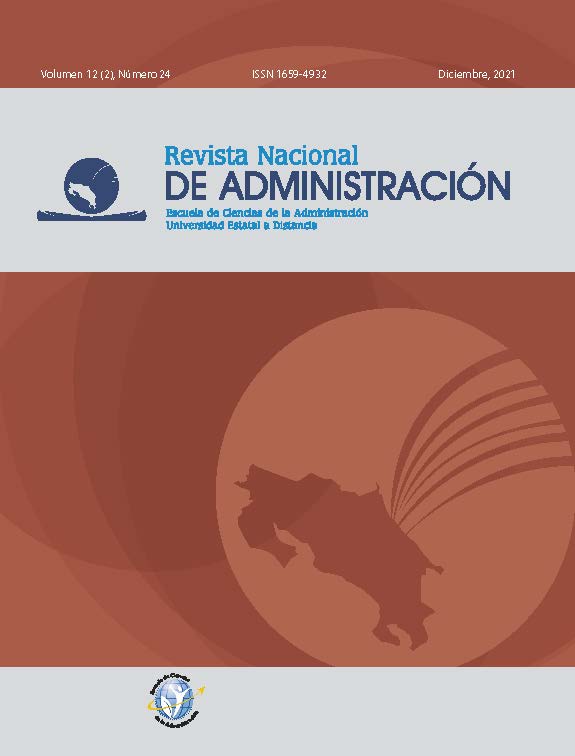Public-Private Partnerships and Their Limiting Factors for a Sustainable Public Sewerage Industry: A Comparative Analysis of Three Municipal Cases in Japan
DOI:
https://doi.org/10.22458/rna.v12i2.3771Palabras clave:
Asociaciones público-privadas, concesión, empresas de propiedad públicaResumen
This study focuses on the conditions for the implementation of the APP, in the form of a concession for the management of the sewerage business. Three uncertainties were identified as limiting factors for PPPs; a) level of service to ensure sustainability, aging of machinery and equipment; b) public spending on rain and the national government subsidy system; c) residents' perception of the water business and the provision of equitable services. The methodology includes case studies (cities of Hamamatsu, Osaka and Nara in Japan). It consists of two parts: a) analysis of relevant published materials and b) application of surveys and semi-structured interviews with municipal officials and, in the case of Osaka, an affiliated company established to operate the sewer business.
Citas
Bakker, K. (2003). Archipelagos and Networks: Urbanization and Water Privatization in the South. Geographical Journal, 169(4), 328-341.
Bakker, K. (2007). The ‘Commons’ versus the ‘Commodity’: Alter‐globalization, Anti‐privatization and the Human Right to Water in the Global South. Antipode, 39(3), 430-455.
Cesar, S. (2019). Privatization of Water: Evaluating Its Performance in the Developing World. Annals of Public and Cooperative Economics, 90(1), 5-23.
Fujiwara, N. (2020). Administrative Reform for Sustainable Public Water Services in Japan: A Case Study of Sewerage Management Reform. Asian Review of Public Administration, 30(1-2), 54-70.
Furlong, K. (2012). Good Water Governance Without Good Urban Governance? Regulation, Service Delivery Models, and Local Government. Environment and Planning A, 44(11), 2721-2741.
Furlong, K. & Bakker, K. (2010). The Contradictions in ‘Alternative’ Service Delivery: Governance, Business Models, and Sustainability in Municipal Water Supply. Environment and Planning C: Government and Policy, 28(2), 349-368.
Hamamatsu City Government. (2017). Hamamatsu-shi niokeru Gesuido Jigyo Heno Konseshon Hoshiki Donyu nitsuie [The Introduction of Concession System to Sewerage Business in Hamamatsu City].
Hart, O. (2003). Incomplete Contracts and Public Ownership: Remarks, and an Application to Public-Private Partnerships. The Economic Journal, 113(486), C69-C76.
Jensen, O. (2017). Public-Private Partnerships for Water in Asia: A Review of Two Decades of Experience. International Journal of Water Resources Development, 33(1), 4-30.
Koppenjan, J.F.M. & Enserink, B. (2009). Public-Private Partnerships in Urban Infrastructures: Reconciling Private Sector Participation and Sustainability. Public Administration Review, 69(2), 284-296.
Nara City Government. (2017). Nara-shi Shokibo Jyogesuidoshisetsu niokeru Kanminrenkeijigyo no Torikumi [The Efforts of PublicPrivate Partnership Projects in Small-scale Water and Sewerage Facilities in Nara City].
Osaka City Government. (2002). Osaka-shi Gesuido Jigyo Keieikeitai Minaoshi Kihon Hoshin [Osaka City Sewerage Business Management Form Review Basic Policy].
Swyngedouw, E., Kaika, M. & Castro, J.E. (2002). Urban Water: A Political-Ecology Perspective. Built Environment, 28(2), 124-137.
Tremml, T. (2019). Linking Two Worlds? Entrepreneurial Orientation in Public Enterprises: A Systematic Review and Research Agenda. Annals of Public and Cooperative Economics, 90(1), 25-51.
Tsujii, M. (2017). Nara-shi Jhogesuido niokeru Konseshon no Torikumi nituite [Concession Initiatives in Nara City Water and Sewerage]. Shintoshi, 71(12), 21-25.
Warner, M. E. & Bel, G. (2008). Competition or Monopoly? Comparing Privatization of Local Public Services in the US and Spain. Public Administration, 86(3), 723-735.
Publicado
Cómo citar
Número
Sección
Categorías
Licencia
Derechos de autor 2021 Revista Nacional de Administración

Esta obra está bajo una licencia internacional Creative Commons Atribución-NoComercial-CompartirIgual 4.0.
Aquellos autores/as que tengan publicaciones con esta revista, aceptan los términos siguientes:
- Los autores/as conservarán sus derechos de autor y garantizarán a la revista el derecho de primera publicación de su obra, el cuál estará simultáneamente sujeto a la Licencia de reconocimiento de Creative Commons que permite a terceros compartir la obra siempre que se indique su autor y su primera publicación esta revista.
- Los autores/as podrán adoptar otros acuerdos de licencia no exclusiva de distribución de la versión de la obra publicada (p. ej.: depositarla en un archivo telemático institucional o publicarla en un volumen monográfico) siempre que se indique la publicación inicial en esta revista.
- Se permite y recomienda a los autores/as difundir su obra publicada en la revista a través de Internet (p. ej.: en archivos telemáticos institucionales o en su página web).

